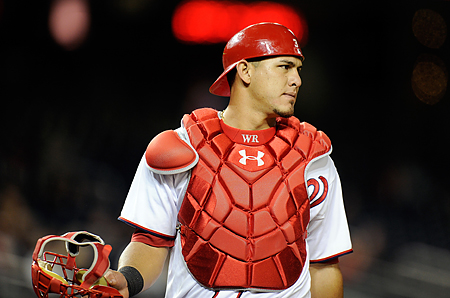
Catcher Wilson Ramos #3 of the Washington Nationals walks to home plate during the game against the Florida Marlins at Nationals Park on September 16, 2011 in Washington, DC. (Photo: G Fiume / Getty Images)
Venezuela has reason to celebrate this morning, Nov. 12, after last night’s rescue of kidnapped baseball star Wilson Ramos. The Washington Nationals catcher, who had come home to play in the winter league, was abducted by gunmen at his mother’s home Wednesday night in Valencia, southwest of Caracas, in the first known kidnapping of a major-league baseball player in Venezuela. “I’m still very nervous, but thank God everything turned out well,” Ramos, 24, said after commandos raided a house 40 miles to the northwest of Valencia and, after a shootout with his abductors, retrieved him unscathed. “It was hard for me to think I was going to come out of this alive.” Ramos added: “The boys did a great job.”
They did – and in the process they brought Venezuelan President Hugo Chávez some respite from criticism that he’s failed to tackle his country’s spiraling violent crime crisis. Justice & Interior Minister Tareck El Aissami said today that five men had been arrested after the Friday night operation, including a Colombian national with ties to a kidnapping gang. (Ramos said after his rescue that his abductors had “Colombian accents.”) After close relatives of three other Venezuelan major-leaguers were kidnapped in the South American country in the past three years – one of them killed – it was imperative for the left-wing President, who faces a re-election bid next year, to bring Ramos back safe. Chávez’s Communications Minister, Andrés Izarra, wasted little time Friday night tweeting the triumph: “Beisbolista Ramos found alive by security forces in mountainous zone of Montalban, Carabobo state!”
But there was one facet of the Ramos rescue that is noteworthy in terms of Venezuela’s long-term security: the boys who did a great job weren’t police SWAT-team members but National Guard troops. Venezuela, in fact, can’t rely on its police forces, many of them too corrupt and incompetent to trust, to carry out the kind of investigative and commando missions that saved one of the country’s most popular beisbolistas. In fact, a fifth of all crimes in Venezuela are committed by cops. And while that problem certainly pre-dated Chávez’s 1998 election, it has worsened amid his obsession with beefing up his military – his shopping sprees for weapons and fighter jets from countries like Russia – at the expense of building the modern, professional police and judicial systems the oil-rich nation lacks.
As a result – with Venezuela suffering one of Latin America’s highest murder rates and Caracas now the western hemisphere’s second-deadliest city – the hope is that Chávez will view the Ramos case as even more impetus to carry out the national police reform he started only last year. In August 2010, after appointing human-rights activist Soraya El Achkar as the head of a General Police Council, he set a two-year deadline for putting a new National Police force on Venezuela’s streets. The government claims that a pilot program in Catia, one of Caracas’ most violent ranchos, or slums, has already yielded a drop in murders. Achkar, who also heads up a new police university, pledged at a police reform seminar in Caracas on Thursday to create a force that “permanently educates itself and doesn’t leave us vulnerable.”
But until Venezuela does produce a competent constabulary, don’t be surprised if the country’s major-league baseball stars start balking at winter-league play in their homeland. Miami Marlins pitcher Aníbal Sánchez, a native of Maracay, not far from Valencia, told the Miami Herald after Ramos’ kidnapping that he’d cancelled a visit home in December because of security concerns and will not spend any of the offseason in Venezuela. “I’m very nervous,” Sánchez said.
Back in Venezuela, people for the moment are exultant, holding small rallies and shouting “Wil-SON! Wil-SON!” But once the celebration dies down, they too will still likely be very nervous about their security situation.

